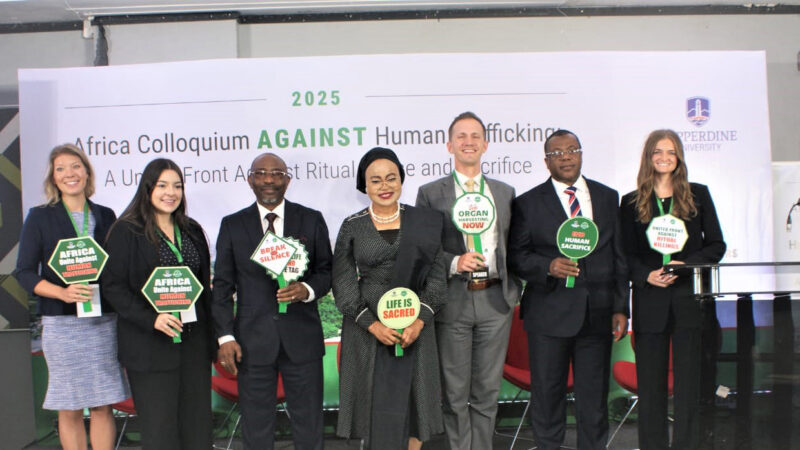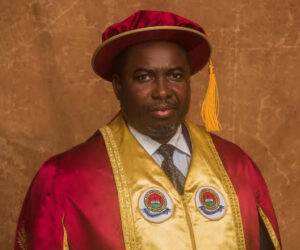1
As human trafficking grows more complex across Africa merging with ritual crimes, organ trade, and cyber exploitation , Lagos is emerging as the continent’s strongest legal and institutional defender. With bold laws, coordinated enforcement, and continental partnerships, the state is redefining Africa’s justice response to one of its deepest moral and human crises.
In what legal observers have described as a defining moment in Africa’s war against modern slavery, the Lagos State Government has reaffirmed its position as the continent’s legal frontrunner in the battle against human trafficking, ritual killings, and organ harvesting
At the heart of this renewed drive is the Lagos State Attorney General and Commissioner for Justice, Mr. Lawal Pedro, SAN, who recently reiterated the state’s commitment to using law, technology, and partnerships to dismantle trafficking networks and protect the dignity of human life.
Pedro, speaking during a multi-agency engagement on anti-trafficking initiatives, declared that Lagos would not only lead Nigeria but also serve as a model for Africa in developing sustainable legal responses to the trafficking crisis.
“We are building a system where human life is sacred, where justice is swift, and where traffickers can find no refuge under the law,” the Attorney General stated.
He emphasised that the state’s current approach is anchored on three pillars — strong legislation, effective enforcement, and survivor rehabilitation , forming what he called “a holistic justice pathway” that addresses both the crime and its social roots.
Lagos, through its Task Force Against Human Trafficking, has rescued hundreds of victims in recent years, provided rehabilitation, and prosecuted offenders under the state’s strengthened legal framework.
The introduction of the Organ Harvesting Prohibition Law 2024 further fortified this structure, imposing severe penalties on anyone involved in human organ trade, ritual exploitation, or related crimes.
The law, which criminalises not only the act of organ removal but also financial benefit or medical complicity, has been hailed by human rights lawyers as one of the boldest legal steps in sub-Saharan Africa.
According to Attorney General Pedro, the state is determined to make justice “visible and measurable.” He revealed that Lagos is currently deepening partnerships with regional and international agencies, including the National Agency for the Prohibition of Trafficking in Persons (NAPTIP) and the Sudreau Global Justice Institute of Pepperdine University, to enhance prosecution, intelligence sharing, and victim support.
“Human trafficking is not just a legal issue; it is a moral battle and a developmental crisis,” Pedro noted. “Our focus is to build laws that protect, systems that respond, and societies that no longer tolerate exploitation in any form.”
Adding his voice, the Permanent Secretary, Lagos State Ministry of Justice, Mr. Hameed Oyenuga, described the Lagos model as one built on structure, discipline, and data-driven results. He explained that the Ministry is pursuing an inter-agency coordination strategy that brings together prosecutors, investigators, and social welfare officers under one operational framework.
“Our mission is not rhetoric but results,” Oyenuga said. “We are equipping our task force with tools, training, and partnerships to ensure that every case of trafficking is pursued to its logical conclusion — from rescue to reintegration.”
He further highlighted the significance of community engagement and preventive education, noting that awareness alone is not enough.
“We are moving from conversations to capacity,” he said. “We have trained over a hundred community advocates across local councils, who now serve as first responders and whistleblowers in vulnerable communities.”
Human Trafficking and Ritual Crimes: A Growing Convergence
Experts warn that human trafficking in Nigeria has evolved into a complex network that often intersects with ritual killings and organ trade. Victims, mostly women and children, are lured with promises of employment or spiritual deliverance, only to end up in cycles of violence, exploitation, or death.
The National Bureau of Statistics reported that over 150 ritual-related killings were recorded within the first half of 2025, many linked to trafficking syndicates operating across states and borders.
According to data from NAPTIP, traffickers now rely heavily on digital tools and social media to recruit victims. The agency also reports an alarming rise in ritual-linked trafficking, where oath-taking and fetish rituals are used to control victims psychologically — replacing physical chains with spiritual fear.
At the continental level, the Director-General of NAPTIP, Mrs. Binta Adamu Bello, has consistently called for stronger intergovernmental coordination, describing human trafficking as a transnational enterprise worth over $230 billion annually in illegal profits.
Speaking on recent collaborative efforts with Lagos, Bello commended the state’s commitment to both enforcement and survivor protection. She outlined NAPTIP’s five-point approach — Policy, Prevention, Protection, Prosecution, and Partnerships — as the foundation for Africa’s unified response.
“Lagos has become a beacon of hope and a model of practical justice,” Bello said. “Our shared goal is to strengthen institutions and harmonise laws across African states so that traffickers find no safe haven.”
She added that technology, cross-border intelligence, and survivor-centred justice systems will define the next phase of Africa’s anti-trafficking framework.
The Lagos State Task Force Against Human Trafficking continues to stand out for its integrated strategy that combines law enforcement, social work, and rehabilitation. Victims are provided with shelter, counselling, medical care, and vocational training, ensuring that rescue is followed by recovery.
For survivors like those rescued from trafficking rings in 2024 and 2025, Lagos offers a pathway back to normalcy. The emphasis, according to officials, is not just on punishment but on restoration — rebuilding lives broken by exploitation.
This approach, analysts say, reflects a maturing justice system that understands that deterrence alone is insufficient. By prioritising rehabilitation, Lagos is attacking the root causes of vulnerability — poverty, ignorance, and desperation — which traffickers exploit.
Collaborating for Continental Response
The Lagos initiative has gained traction beyond Nigeria’s borders, with several African states expressing interest in adopting similar legal and institutional frameworks. Through its partnership with NAPTIP and the Sudreau Global Justice Institute, the state is working to standardise best practices across the continent — from prosecution templates to witness protection protocols.
This regional collaboration aims to close jurisdictional gaps that allow traffickers to evade justice by moving victims or profits across borders. It also seeks to create a unified African position on trafficking-related legislation, ensuring that the crime attracts consistent and severe punishment everywhere on the continent.
As Lagos deepens its commitment, experts insist that government alone cannot win the war. The responsibility, they argue, lies with society — families, religious leaders, traditional institutions, and the media — to reject the myths and materialism that feed the trade in human beings.
Attorney General Pedro echoed this sentiment, saying the time has come for Africa to defend its humanity through its laws. “When a society begins to sell its own people, it loses its soul,” he warned. “We must rise together to end this moral and legal tragedy.”
From the corridors of justice in Lagos to the offices of NAPTIP and allied institutions across Africa, a new consensus is emerging: that the trafficking of humans is not just a criminal act but a violation of the continent’s conscience.
In this continental struggle, Lagos is not just a participant, it is leading from the front, using the power of law to protect life, restore dignity, and inspire a justice movement that Africa desperately needs.







